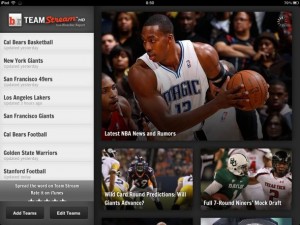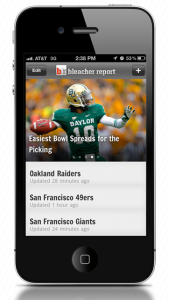There’s a lot of talk on the interwebs today about ESPN saying that it designs its content sites and programs first for the mobile experience, a statement that is not so surprising on its face but still probably somewhat of a shock to the general public who still thinks of ESPN as something you watch on a TV, either in a bar or in your living room.
But as our old pal Om Malik notes, with 400 million smartphones out there it’s pretty clear what’s going to happen. Om says:
With more than 400 million smartphones expected to be sold, it makes perfect sense for sports to get the mobile bump. I mean, don’t we want the baseball gossip, score updates or results of the F1 race when on the go?
The obvious takeaway from ESPN is: The future of fat profits in content is mobile, and we’re all over it. What that means for startups and established players looking to get into the mobile-sports arena is that your business plan better have a provision for what you will do when the WorldWide Leader becomes your competitor.
The design-for-mobile-first mantra is widespread in the sports content world — it is even part of our internal thinking here at humble MSR — but when big players like ESPN and Bleacher Report start talking about how mobile isn’t something in the future but something that is here now it makes sense.
For most desktop Internet connections, bandwidth, screen size and network latency generally aren’t problems when it comes to site experience. On a small handset with extreme variables in network connection, screen size and local processing power, how a site is designed has a huge impact on how it is seen. And you don’t need any exhaustive usability studies to tell you that people don’t come back to a site that doesn’t load or isn’t usable on a small screen. With development resources in demand everywhere, it makes sense to put an emphasis on mobile, which is growing fast and has the more-stringent demands.
At least it does to ESPN. If you’re a business looking at the mobile-sports space, the question is now: if the leader is already there, what are you doing to design for mobile?
The MediaPost recap by Mark Walsh of the keynote speech from Michael Bayle, vice president and general manager of ESPN Mobile, is worth a long read because it touches on a lot of places where ESPN sees mobile going. But a quick grab of a stat from the post should make it easily understandable why ESPN cares so much:
Bayle pointed out that its mobile audience across its mobile properties has surpassed 20 million, with users spending 45% more time with ESPN mobile content in 2011 than the prior year. ESPN Mobile now ranks as the company’s fourth-largest network and it has 150,000 people plugged into its mobile offerings at any given time.
Sounds like it’s more than just cowboys at horse troughs watching ESPN in a mobile fashion. And it will be more so going forward.



















